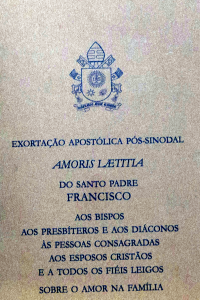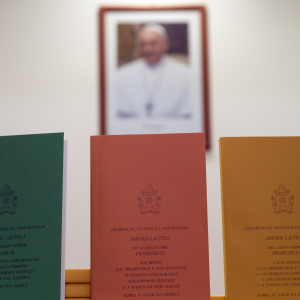Pope Francis has opened the way for divorced and remarried Catholics to receive holy communion in the long-awaited publication on his comments on the two Synods of Bishops On the Family today (Friday).
The 260-page apostolic exhortation Amoris Laetitia - authored by Pope Francis - was published at 11am (BST) and the carefully chosen language is expected to allow enough leeway to parish priests to make a judgment call on what has been a widely contentious issue throughout Pope Francis’ reign.
"It can no longer simply be said that all those in any 'irregular' situation are living in a state of mortal sin and are deprived of sanctifying grace," Francis writes in chapter 8.
"It is necessary to recognise that responsibility with respect to certain actions or decisions is not the same in all cases," he says, arguing that "general rules set forth a good which can never be disregarded or neglected, but in their formulation they cannot provide absolutely for all particular situations".
Accepting that an "objective situation of sin" may not be "subjectively culpable, or fully such" he says the Church has a responsibility regarding someone in a situation to which this description applies. A person may need to "love and … also grow in the life of grace and charity, while receiving the Church's help to this end." Then, in what will be seen by many as an explosive footnote (351) he says that: "In certain cases, this can include the help of the sacraments." He mentions both confession and Eucharist, which "is not a prize for the perfect, but a powerful medicine and nourishment for the weak."
In what many will read as departures from positions taken by Benedict XVI when he was Pope, and beforehand when he was Prefect of the Congregation for the Doctrine of the Faith, Francis remarks in footnote 329, on how "faithfulness is endangered and the good of children suffers" if "certain expressions of intimacy" are lacking when divorced and remarried Catholics live together "as brothers and sisters". It was Cardinal Joseph Ratzinger who stipulated this requirement. As Pope Benedict XVI, he also emphasised the importance of "spiritual communion" (that is, non-sacramental) for divorced and remarried Catholics. Francis makes no mention of this either.
But there was no wriggle room for same-sex marriage as the apostolic exhortation, which is the Pope’s response to the two Synods of Bishops on the Family at the Vatican in October 2014 and October 2015, was very clear that there was no path to same-sex unions being blessed by the Roman Catholic church.
 "We need to acknowledge the great variety of family situations that can offer a certain stability, but de facto or same-sex unions may not simply be equated with marriage. No union that is temporarily closed to the transmission of life can ensure the future of society,” the Pope wrote.
"We need to acknowledge the great variety of family situations that can offer a certain stability, but de facto or same-sex unions may not simply be equated with marriage. No union that is temporarily closed to the transmission of life can ensure the future of society,” the Pope wrote.
And he echoed the words of the bishops who wrote that there are "absolutely no grounds for considering homosexual unions to be in any way similar or even remotely analogous to God’s plan for marriage and family".
While the vast majority of the document ratifies the final document produced by the bishops and handed to the Pope at the end of October, Francis did find space to criticise the Catholic Church’s performance so far on the family. "The way we present our Christian beliefs and treat other people has helped contribute to today’s problematic situation [on the family]. We need a healthy dose of self-criticism," Francis writes.
Amoris Laetitia is Pope Francis’ second apostolic exhortation, after Evangelii Gaudium in November 2013, a document widely seen as a blueprint for Francis’ papacy.
This will be the second papal exhortation on the theme of the family, following Familiaris Consortio by St. John Paul II in 1981.
KEEP UP TO DATE ON TWITTER AND FACEBOOK...
Follow all the latest news and events from the Catholic world via The Tablet's Twitter feed @the_tablet
Or you can join in the debate at our community page on Facebook




 Loading ...
Loading ...